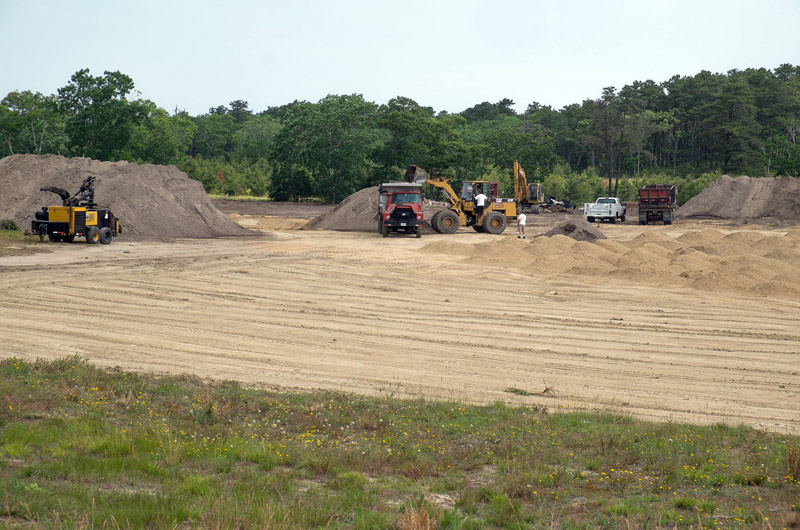After a series of postponements over the past two years, a foreclosure auction is scheduled Friday for property formerly owned by Corey Kupersmith, whose development plans pitted elected leaders, town officials, conservationists, and taxpayers against each other in a bitter fight still referred to by many as the golf club wars. This time, it appears there are no obstacles in the way of a sale.
“This is finally happening Friday,” said Justin Manning, president of JJ Manning Auctioneers, who will handle the foreclosure auction. “It has been postponed more times than anyone would like to remember.”
The auction begins at noon, at the site off County Road. Up for sale are 51 acres of land, which includes 20 building lots and two open space lots.
The new owner of the property is a division of the Patten Companies, a Florida land developer which buys and markets distressed properties. The company bought the mortgage on the property from People’s United Bank of Connecticut, which had begun foreclosure proceedings against a corporation once controlled by Mr. Kupersmith. Under Massachusetts law, by purchasing the mortgage, Patten Companies assumes all the responsibilities of the bank, including the foreclosure proceedings.
And like a bank, Patten Companies has the right to bid on the property at the auction.

“If no one steps up to the plate and pays enough money at the auction, we will essentially take the property back,” said Pete Scerbo, a vice president of Patten Companies. “At that point, we’ll have clean title, and we’ll conduct an auction for the individual lots.”
Mr. Manning said there is substantial interest in the property.
“There’s a really good blend of developers, local and regional, looking at the entire project,” he said, “and there’s a strong group of people interested in individual lots. That component has not existed before.”
The property, known as the Southern Woodlands, is the largest undeveloped tract in Oak Bluffs. It has a long and complicated history. The planned development was a compromise of sorts, intended to end more than three years of divisive political and legal battles.
Mr. Kupersmith began his efforts to develop a private 18-hole golf course on the property beginning in 2000. Three plans were rejected by the Martha’s Vineyard Commission in close votes after heated public hearings. Along the way, Mr. Kupersmith and his associate Brian Lafferty also threatened to build a maximum density affordable housing project of 366 homes and sued the commission, challenging its right to review developments under Chapter 40B, the state affordable housing law. The commission won the case in land court. Later at one point, Mr. Lafferty began clear cutting the property, sawing down about 250 pitch pines and famously posing for a picture with his chain saw. The cutting ended with a cease and desist order from the state Natural Heritage Endangered Species Program.
In 2004, a compromise emerged when Mr. Kupersmith agreed to sell 190 acres of the Southern Woodlands to the Martha’s Vineyard Land Bank and build a 22-home gated luxury community on the remaining 90 acres. This time, all the permitting agencies quickly approved the development, and construction began on roads and utility infrastructure. The foundations and shells of model homes were built on two lots, but construction stopped on the entire development when Mr. Kupersmith’s business empire began to crumble, and then later the real estate market went into a stall when the national economy crashed.
Today the property stands empty and unimproved, the model homes sprayed with graffiti, their windows broken by vandals.
There is some doubt about the status of permits granted for the development in 2004 and 2005, and whether any new owner would have to begin the process over before the MVC and the town.
The town planning board recently hired a New Bedford law firm to research those issues. Daniel Perry said the permits issued by the town may still be valid, but the planning board has a clear legal right to void them since development roads and utilities were never completed. He also said he believes the MVC decision approving the development is still valid.
A buyer would either have to build what the MVC approved in 2005 or return to the commission for a modification. What happens if the lots are sold to individual buyers is less clear.
Mr. Scerbo said the company and its lawyers have had several conversations with Oak Bluffs and MVC officials, and is not aware of any significant permitting issues hanging over the property.
“It’s a recorded and plotted subdivision,” he said. “It’s in existence. Technically it’s done. Utilities are installed. There’s a couple of things that need to be addressed through the town and the commission. They are being disclosed appropriately.”







Comments (4)
Comments
Comment policy »